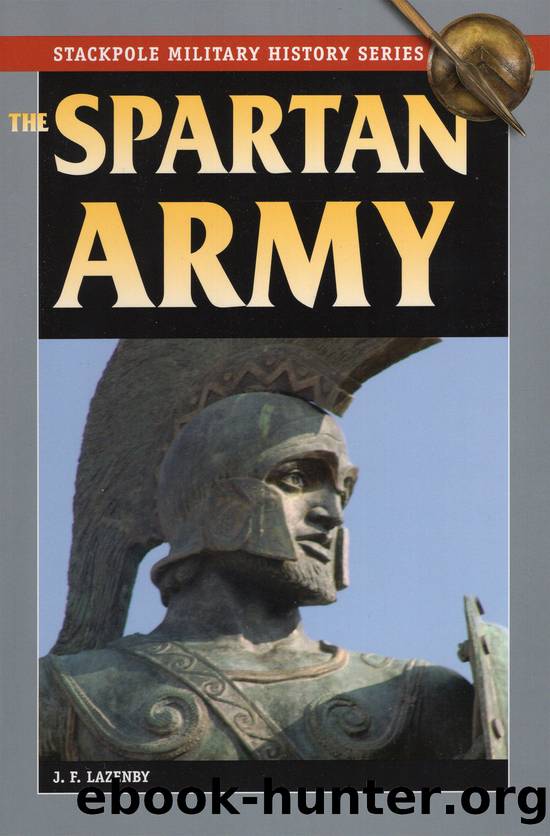The Spartan Army by J. F. Lazenby

Author:J. F. Lazenby
Language: eng
Format: epub
ISBN: 9781461751991
Publisher: Stackpole Books (NBN)
Published: 2016-05-31T00:00:00+00:00
CHAPTER 5
Plataea
Following the forcing of the Thermopylai pass, and the withdrawal of the Greek fleet from Artemision, all central Greece lay open to the invading Persians. The Greek fleet put in at Salamis, at the urgent request of the Athenians and now, if not before, the population of Attica was evacuated. The Persian forces poured southwards, overrunning Attica and capturing the city of Athens, empty of all save a few fanatical or dedicated defenders of the Acropolis. But three weeks or so later, towards the end of September, the Persian fleet was heavily defeated in the straits between Salamis and the mainland and Xerxes himself returned to Asia, though he left an army behind him under his brother-in-law, Mardonios. Mardonios wintered in Thessaly and after failing to win over the Athenians through the agency of Alexander, King of Macedonia, marched south again in the summer of 479, to re-occupy a once more deserted Athens. After considerable Athenian pressure (cf. Herodotos 8. 144.4â5, 9.6â7), the Spartans at last mobilized â it is somehow typical of them that they should have marched in the end without telling the Athenians, so that when Athenian envoys arrived to issue a final ultimatum, threatening to go over to the Persians, they were blandly informed that the Spartan army had already reached Orestheion on its march against âthe strangersâ (Herodotos 9.11.2).
The campaign that followed, culminating in the battle of Plataea, is perhaps the most interesting of the Persian Wars since it allows us to see for the first time how easily the Persians might have won. The Greek army was again commanded by a Spartan â the regent Pausanias â and although the Spartan contingent formed less than a seventh of the whole Greek force, if Herodotosâ figures are correct it was the Spartans, perioikoi and Tegeates who played the principal part in the victory. The 5,000 Spartans who took part, moreover, possibly formed the largest body of Spartan regular soldiers ever to take part in a single battle, and if they all really were Spartiates, as Herodotos describes them, this was almost certainly the largest number of Spartiates ever to fight together.1
Plataea is a curiously neglected battle in some respects: in recent years, for example, two popular books have appeared with the titles The Year of Salamis and The Year of Thermopylae, but we have yet to see a Year of Plataea.2 However, whatever some scholars seem to think, in the end Plataea was at least as âdecisiveâ as Salamis, since even the Peloponnese could not have been conquered by sea-power alone, and however true it may be that the Isthmus of Corinth could not have been held if the Greek fleet had been defeated, it is equally true that without Plataea all Greece north of the Isthmus might well have remained in Persian hands, with incalculable results for the future attitude of the Athenians and hence of the better part of the Greek fleet. In the end nearly all wars, except those involving islands or other states dependent on sea-power, are won and lost by the clash of armies.
Download
This site does not store any files on its server. We only index and link to content provided by other sites. Please contact the content providers to delete copyright contents if any and email us, we'll remove relevant links or contents immediately.
The Daily Stoic by Holiday Ryan & Hanselman Stephen(3299)
The Fate of Rome: Climate, Disease, and the End of an Empire (The Princeton History of the Ancient World) by Kyle Harper(3055)
People of the Earth: An Introduction to World Prehistory by Dr. Brian Fagan & Nadia Durrani(2727)
Ancient Worlds by Michael Scott(2682)
Babylon's Ark by Lawrence Anthony(2671)
The Daily Stoic by Ryan Holiday & Stephen Hanselman(2568)
Foreign Devils on the Silk Road: The Search for the Lost Treasures of Central Asia by Peter Hopkirk(2454)
India's Ancient Past by R.S. Sharma(2450)
MOSES THE EGYPTIAN by Jan Assmann(2411)
The Complete Dead Sea Scrolls in English (7th Edition) (Penguin Classics) by Geza Vermes(2272)
The Earth Chronicles Handbook by Zecharia Sitchin(2226)
Lost Technologies of Ancient Egypt by Christopher Dunn(2222)
24 Hours in Ancient Rome by Philip Matyszak(2078)
Alexander the Great by Philip Freeman(2064)
Aztec by Gary Jennings(2021)
The Nine Waves of Creation by Carl Johan Calleman(1912)
Curse Tablets and Binding Spells from the Ancient World by Gager John G.;(1860)
Before Atlantis by Frank Joseph(1849)
Earthmare: The Lost Book of Wars by Cergat(1820)
